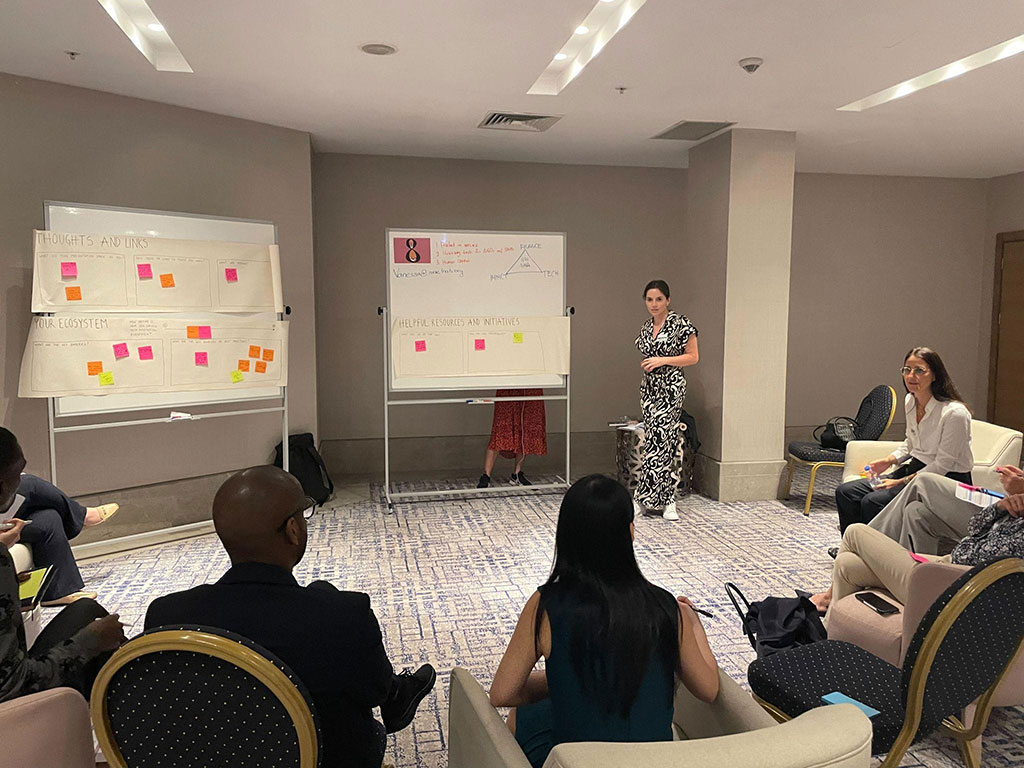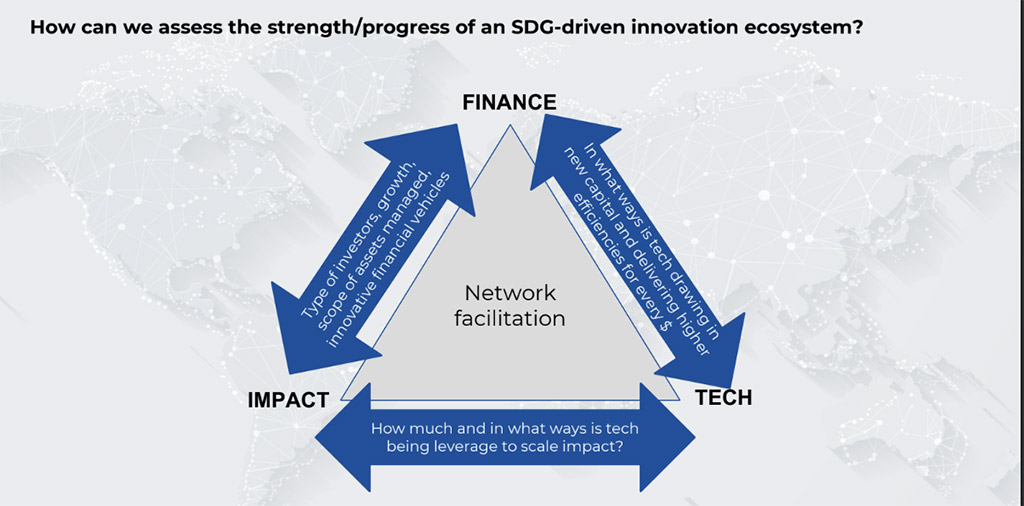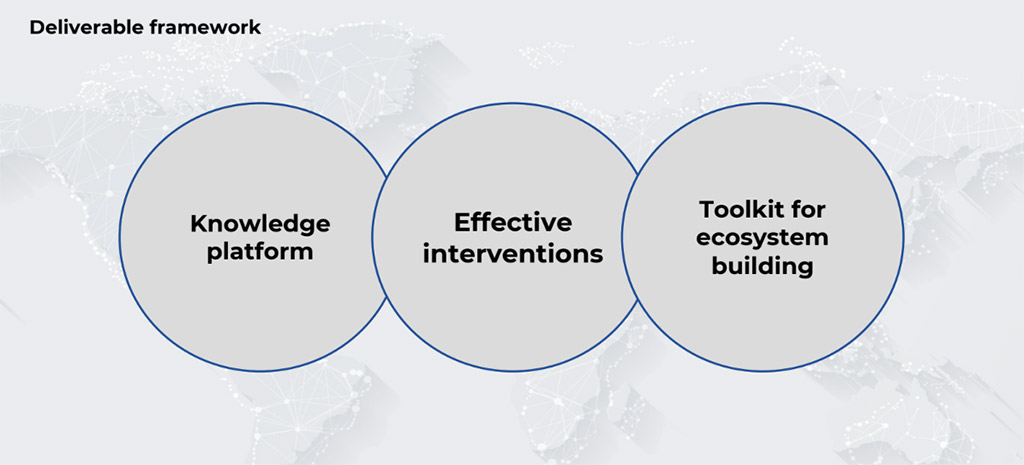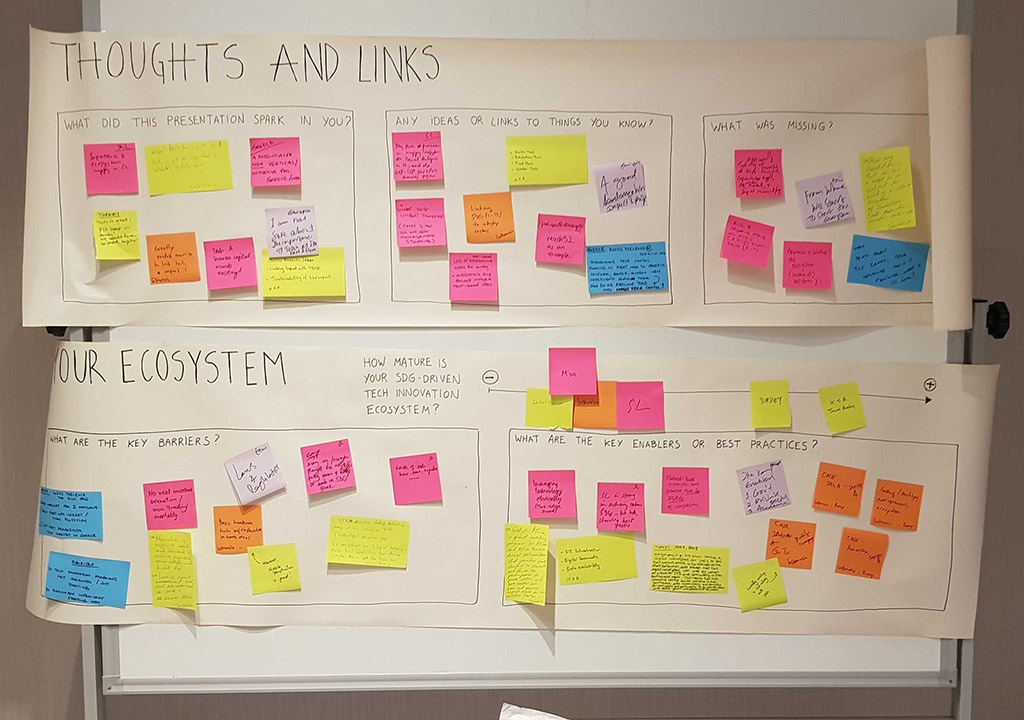SDG NEWSLETTER – JUNE 2023
We are delighted to share the latest updates on our consortium project for the SDG-driven tech innovation ecosystem. Our collective efforts have achieved significant milestones in recent months, propelling us closer to our shared goals.
In May, ahead of the GLM, we released a new instalment of SDG-Tech News. A series of three Three new and insightful blogs explore municipal-level initiatives for SDG-driven tech innovation, frameworks for impact startups and VC investors, and useful resources on policy-led innovation. The blogs draw examples and inspiration from the findings and insights presented in our synthesis report (forthcoming in October 2023).
Later in the month, consortium partners gathered in Istanbul for the highly anticipated GSG Leadership Meeting (GLM). One day prior, the Consortium held an in-person Partner Meeting. The Meeting provided an in-depth opportunity for Partners to share the identified key strengths and challenges of each ecosystem, including Portugal, Italy, France, and Israel and discussed how to develop the conceptual framework and new methodology for capturing SDG-driven tech innovation ecosystems.
Another event highlight was the NAB learning festival, with a session on SDG-driven tech innovation facilitated by IFIE (Israel NAB) and MAZE (Portugal NAB). This session provided a platform to share findings from our project with other participants, fostering collaboration and inspiring new ideas. The learning festival underscores our commitment to knowledge exchange and collective growth within the Consortium.


Figure 1 – IFIE and MAZE introducing the Consortium at the 2023 GSG Leadership Meeting, held between May 30th and June 1st in Istanbul.
With each milestone achieved and every collaborative effort made, our consortium project continues to gain momentum. Stay tuned for more exciting updates as we progress towards our shared vision of a tech-driven sustainable future.
IFIE (Israel NAB)
The consortium partner meeting of the SDG-driven tech innovation ecosystem, held during the GSG Leadership Meeting in Istanbul, was an extraordinary gathering that is already making a lasting impact.
As the creators of this project, we found ourselves venturing into uncharted territory as we sought to translate our research into concrete actionable steps that could make a difference across different ecosystems and countries. The discussions among consortium members centered around this goal, exploring how we could effectively implement our findings. At the meeting, IFIE presented two frameworks that have started to take shape for the Israeli case based on the research:
- A Triangle model connecting Finance, Technology and Impact, where ecosystem builders (essentially the NABs) are situated in the middle as market, network or ecosystem facilitators, in line with the role outlined in our forthcoming Building Blocks Framework for Building SDG-Tech Driven Innovation Ecosystems.

Figure 2 – A Triangle Model describing the role of NABs in facilitating SDG-driven innovation ecosystems, proposed by IFIE.
- Identifying three types of “Impact Tech” or “Tech for the SDGs.” – What use-cases are we seeing for understanding the importance of SDG-driven innovation ecosystems?
- Products and Services – Innovative tech solutions addressing SDG challenges, generating profits and impact.
- Data and Performance Management for non-profits, non governmental organisations (NGOs), social economy organisations, public entities- Digital solutions to scale and drive the efficiency of these actors and stakeholders
- Training and skills development for under-represented groups within the tech sector – Access to Science, Technology, Engineering, Maths (STEM) training and job placements enabling opportunties for sustainable, quality employment and social and economic mobility.
As a next step, the release of Building Blocks Framework and Synthesis Report will facilitate the identification of best practices, enable the modularisation of these practices into a toolkit, and a set of “Tech for the SDGs” applications and affiliated stakeholders. The aim is to introduce this framework to fellow NABs and market builders, thereby enhancing SDG-driven innovation ecosystems on a global scale.
 Figure 3 – The SDG-Driven Tech Innovation Consortium Deliverables Framework
Figure 3 – The SDG-Driven Tech Innovation Consortium Deliverables Framework
Following the consortium meeting, we engaged during the GSG leadership meeting in different sessions with other stakeholders and NABs to get their feedback. These frameworks the discussion aroused significant interest among the different NABs and NAB Taskforces, as well as a strong willingness to strategically integrate the ‘SDG Impact Tech’ approach.
We look forward to taking our project to the next level at the GSG summit in Malaga to be able to showcase the work we’ve accomplished so far to a wideraudience and to establish the SDG Impact Tech as a main vertical in the impact movement led by the GSG and NABs.
MAZE (Portugal NAB)
As part of the official agenda for the 2023 GSG Leadership Meeting (GLM), MAZE was invited by the GSG to combine efforts with the Israeli Forum for Impact Economy (IFIE) to facilitate a session on Building Technology Ecosystems to Achieve the SDGs.
The goals of the session included:
- Sharing some of the intentions and insights that have resulted from our project so far;
- Encouraging the engagement of other Impact Investment National Advisory Boards with the topic; and
- Collecting insights from the participants regarding best practices, needs, and proposals.
The team ran three back-to-back identical sessions with a small number of participants, which helped to enable engaging discussions and resulted in a number of relevant ideas as well as an understanding that there is an appetite for the topic of better understanding SDG-focused tech innovation within and beyond European ecosystems.
 Figure 4 – Two of the boards used to collect contributions from participants during the learning festival session on Building Technology Ecosystems to Achieve the SDGs that took place as part of the official agenda for the 2023 GSG Leadership Meeting, held between May 30th and June 1st in Istanbul.
Figure 4 – Two of the boards used to collect contributions from participants during the learning festival session on Building Technology Ecosystems to Achieve the SDGs that took place as part of the official agenda for the 2023 GSG Leadership Meeting, held between May 30th and June 1st in Istanbul.
The Oceano Azul Foundation and the Calouste Gulbenkian Foundation are set to launch the 6th edition of the Blue Bio Value acceleration program in September. This 10-week program aims to accelerate startups operating in the blue biotechnology sector, specifically in the marine bioresources chain, to promote a global and sustainable blue bioeconomy. Applications closed on June 12th, and the selected cohort will be announced during the summer.
Five years after the 1st edition, the 2nd edition of Aldeia da Inovação Social took place from June 20th to June 21st in Alentejo, Portugal. Portugal Social Innovation is the promoter of the event. The programme includes 130 speakers, 10 workshops, and multiple activities. Despite the event not focusing on tech, it will bring together key players from the Portuguese social innovation ecosystem across sectors (public, private, and social) to discuss relevant topics and further develop the ecosystem. The goal is to strengthen Portugal’s position as a global innovation leader.
BCSD and Grace, prominent associations that put together stakeholders in the Portuguese social economy, have been taking the lead in promoting the SDG agenda, particularly in the corporate realm. In June, they hosted a Masterclass dedicated to the SDGs. This masterclass explored integrating the SDGs into management practices, covering the framework, best practices for reporting and communication, and relevant tools. It is part of a series of initiatives aimed at raising awareness and fostering SDG adoption.
Next Steps / Plans
In the next months, MAZE will continue to collaborate toward the successful completion of the written outputs of this project, as well as the design of future initiatives that could be relevant to promote the development of SDG-aligned Tech Ecosystems in Europe. In the short term, the priority will be to discuss how best to take advantage of the GSG Global Impact Summit in Málaga to launch the final State of Play Report.
Social Impact Per L’Italia (Italy NAB)
The Italian innovation community has been organising and participating in engagement workshops and thematic conversations throughout the country, generating significant interest in the topic.
During our national engagement workshop “Creating next-gen innovation ecosystems catalysing digital social innovation and Technology to address global challenges,” held in February 2023 by Sapienza University in Rome, we identified seven key areas to build up a sound SDG-driven tech innovation ecosystem in Italy as follows:
- training and capacity building as a top priority to facilitate cultural change, especially within financial institutions;
- working with financial intermediaries and banks to develop financing tools suitable for social enterprises;
- matching supply and demand in financial markets overcoming the “risk first” paradigm and creating more opportunities for impact-driven startups;
- developing shared impact standards among different stakeholders and linking them to a system of databases and parameters to be available on platforms accessible to all;
- collecting and making available data and identifying relevant solutions on how to run sustainable innovation development funds;
- fully exploiting the opportunity of the National Recovery and Resilience Plan for the impact economy; and
- empowering the next generation of leaders as a fundamental step for radical change in all stakeholder settings.
These action points were further reinforced during a conversation held in May at the International Conference “Microfinance: features, challenges, services for a more social economy” hosted by the Metropolitan City of Bologna. The importance of developing impactful business models supported by impact investors, policymakers, and social economy networks was emphasised. Similar discussions took place at the “We Make Future Festival – WMF 2023” in Rimini, where the workshop on “Impactful Business Models” highlighted the role of impact investors and responsible consumer communities.
All the valuable inputs and insights gathered from the Italian innovation ecosystem over the past months have been carefully considered and integrated into our Horizon Europe SDG-driven innovation ecosystem-building model, which will be released soon. Stay tuned!
FAIR (France NAB)
Viva Tech, the world’s leading tech and startup event, took place in Paris, France, on 17 June 2023. With an attendance of 150,000 visitors and 405,000 startups, this event stands as one of the largest global tech gatherings. Notably, French President Emmanuel Macron announced a plan to invest nearly €6 billion in positive impact startups and €50 million in artificial intelligence.
While this investment appears favourable for startup development, it’s important to note that the economic model of startups doesn’t always automatically align with the SDGs outlined in the 2030 Agenda. According to Tech for Good France’s press release regarding Paul Midy’s report on financial support for innovative and growing startups and SMEs, future measures will prioritise hypergrowth and “pure” tech innovation rather than considering the project’s nature and its concrete impact on society. Additionally, the social innovation ecosystem, consisting of conscientious “limited profit” organisations, still awaits this type of support, as observed by Maud Sarda, co-founder of the French social enterprise Label Emmaus.
Ongoing efforts by the Mouvement Impact France to “stop tech for bullshit” and regional initiatives by Le Poool and La French Tech Rennes Saint Malo to promote virtuous innovation highlight the need for a balanced approach. Real solutions are abundant, as demonstrated by the ChangeNow Summit 2023, held from May 25- 2727, 2023, with 1,000 visitors and 400 solutions. The summit’s session replays and accessible solutions continue to inspire. Let’s remain hopeful that equal amounts of funding will flow towards tech for good endeavours.
PROJECT PARTNERS & SPONSORS




The consortium’s work is generously supported by a grant from the European Commission through its Horizon 2021-2027 European Innovation Ecosystems (EIE) initiative.
DISCLAIMER
Funded by the European Union. Views and opinions expressed are however those of the author(s) only and do not necessarily reflect those of the European Union or [name of the granting authority]. Neither the European Union nor the granting authority can be held responsible for them.

